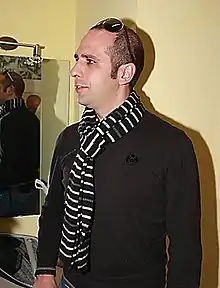Checco Zalone
Checco Zalone (Italian pronunciation: [ˌkekko ddzaˈloːne], modeled on the Apulian insult "Che cozzalone!", lit. 'What a rough!'), art name of Luca Pasquale Medici[1] (born 3 June 1977), is an Italian actor, musician, singer-songwriter, imitator, comedian and screenwriter. He co-wrote and starred in the five highest-grossing Italian films in Italy headed by Quo Vado?.
Checco Zalone | |
|---|---|
 | |
| Born | Luca Pasquale Medici 3 June 1977 Capurso, Italy |
| Occupation | Actor |
| Height | 1.73 m (5 ft 8 in) |
Biography and career
Luca Medici was born in Capurso, in the first hinge of the metropolitan area, close to the suburbs south of Bari. The pseudonym Checco Zalone, in Bari dialect, recalls the expression "che cozzalone!", Whose equivalent and much better known meaning , taken from the Bari expression it would mean: "che tamarro!". During his teens he was very fond of video games and spent most of his afternoons indoors. He graduated from the scientific high school Sante Simone in Conversano, later he enrolled at the University of Bari Aldo Moro, where he graduated in law. In the meantime he participates in the competitions as deputy police inspector and Inail in Rimini, but is rejected.
After being a regular in many editions of the Canale 5 variety show Zelig, he became famous in 2006 thanks to the song "Siamo una squadra fortissimi", celebrating the Italian team just before the 2006 FIFA World Cup.[1]
In 2009 he co-wrote and starred in Cado dalle nubi, co-written by Gennaro Nunziante, who also directed.
In 2011 he again co-wrote and starred in Che bella giornata also co-written and directed by Nunziante. It opened with a record Italian opening weekend of $9.4 million[2] and became the highest-grossing Italian film of all-time in Italy, grossing €43.4 million,[3] surpassing Roberto Benigni's Life Is Beautiful.[4] Life Is Beautiful retained the worldwide record for an Italian film with $70 million worldwide.[4]
In 2013, he and Nunziante followed it up with Sole a catinelle which surpassed it with an opening record of €19.2 million and a total gross of €51.9 million.[3][5][6]
In January 2016, his and Nunziate's next film Quo Vado? set another opening weekend record grossing over €22m (£16.5m) over the three-day holiday weekend[5][7][8] and went on to become the highest-grossing Italian film of all-time[9] with €65.3 million, second only to Avatar in Italy with €65.7 million.[9] In the same year, Zalone was the Italian testimonial of the funding raising campaign for the research on Spinal muscular atrophy.[10][11]
His and Nunziate's films are currently the second, third, fifth and sixth highest-grossing films in Italy.
Filmography
- Cado dalle nubi (2009)
- Che bella giornata (2011)
- Sole a catinelle (2013)
- Quo Vado? (2016)
- Tolo Tolo (2020)
References
- Zalone, Checco, in Treccani, Istituto dell'Enciclopedia Italiana. 15 March 2011.
- "Beautiful Day' now Italy's most successful film (Reuters)". 17 January 2011.
- "Annuario Cinetel 2014" (PDF). Cinetel. Archived from the original (PDF) on 7 January 2016. Retrieved 3 October 2019.
- Lyman, Eric J. (4 November 2013). "Italian Comedy 'Sun in Buckets' Sets New Opening Weekend Sales Record". The Hollywood Reporter. Retrieved 3 October 2019.
- Anderson, Ariston (4 January 2016). "Italy Box Office: Local Hit 'Quo Vado?' Sets Opening Records". The Hollywood Reporter. Retrieved 4 January 2016.
- Lyman, Eric J. (4 November 2013). "Italian Comedy 'Sun in Buckets' Sets New Opening Weekend Sales Record". The Hollywood Reporter. Retrieved 4 January 2016.
- Hoad, Phil. "Backward-looking The Force Awakens might pay the price beyond the west". The Guardian. Retrieved 12 January 2016.
- "Quo Vado? has beaten Star Wars at the box office". The Independent. Retrieved 12 January 2016.
- Niola, Gabriele (14 January 2016). "Italy box office: 'Quo Vado?' becomes biggest ever local film". Screen Daily. Retrieved 3 October 2019.
- Pizzimenti, Chiara. "Sma, il nuovo, magnifico, spot di Checco Zalone". Vanity Fair (in Italian). Retrieved 2 October 2020.
- Francesca Galici (2 October 2020). ""Ciao grande Mirko". L'addio di Zalone all'amico malato di Sma". Il Giornale (in Italian).